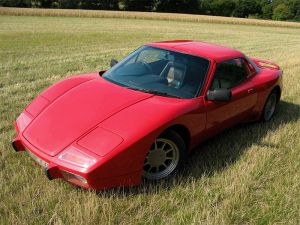Gold Cirrus
| Gold Cirrus | |
|---|---|
 The Gold Cirrus. The Gold Cirrus. | |
| Vehicle | Gold Motor Company Cirrus |
| Origin |
|
| Type | 4WD sports car |
| Engine | 3.5L V-8 |
| Displacement | 200 brake horsepower |
| Produced | 1989 - 1991 |
| Appeared in | Top Gear: Series 26, Episode 5 (1991) |
Not to be confused with the Chrysler Cirrus.
The Gold Cirrus was a lightweight sports car built around a transversally-mounted Rover V8 engine by the shortlived Gold Motor Company as an all-British alternative to various European sports car marques such as Porsche and Ferrari. The car was designed by Nick Butler, who founded the company around 1984[1] after his success at building hot rods. An initial gold prototype was built around 1989, and a more production-ready example built in 1991, where it was shown at that year's Motorfair exhibition at Earl's Court. The car was featured on the cover of the August 1991 issue of Performance Car, before appearing on Top Gear later that same year.
Appearance
The Cirrus made its sole Top Gear appearance as part of the programme's coverage on Motorfair '91, and was driven by Tiff Needell. Needell complimented the car on its resourcefulness, ability to convert between a coupé and cabriolet design, and its handling, but criticised its lack of power and hefty projected £45,000 price tag. Moving towards the interior, Needell particularly liked the usage of Connolly Leather for the upholstery and Recaro seats, in addition to how the entire cockpit binnacle adjusted when one moves the steering rack as opposed to just the wheel, but didn't like the foot pedal arrangement and felt the brake needed a servo for more accurate application. From a mechanical perspective, Needell also felt the gear changes were rougher than necessary. He remarked that the concept of the Cirrus was a bit of an "indulgence", but a nice one.
Unfortunately, the Cirrus never hit widespread manufacture, and the company regressed[2] into building and selling recreational vehicles. Supposedly numerous attempts were made up until 1996[3] through a second company called Scornhill Motors in order for the car to enter mass production, but in the end, fewer than 5 finished examples were ever built.
References
- Vehicle pages
- Vehicles produced by Gold Motor Company
- Gold Motor Company Cirrus
- British vehicles
- Cars
- 4WD cars
- 4WD sports cars
- Sports cars
- British cars
- Gold Motor Company cars
- Gold Motor Company sports cars
- Cars with an engine displacement of 3 - 3.9 litres
- Cars with an exact engine displacement of 3.5 litres
- Cars with V-8 engines
- Cars with 8 cylinder engines
- Vehicles with a power output of 200 BHP
- Vehicles which entered production in 1989
- Vehicles which ceased production in 1991